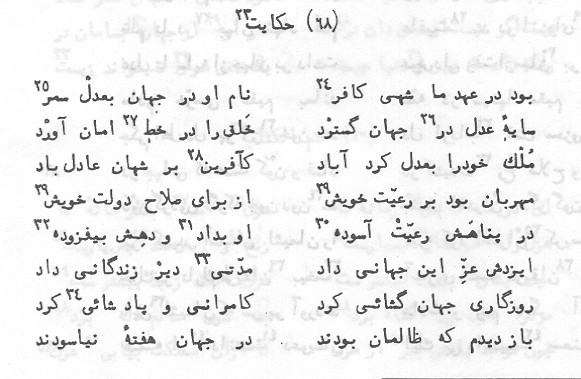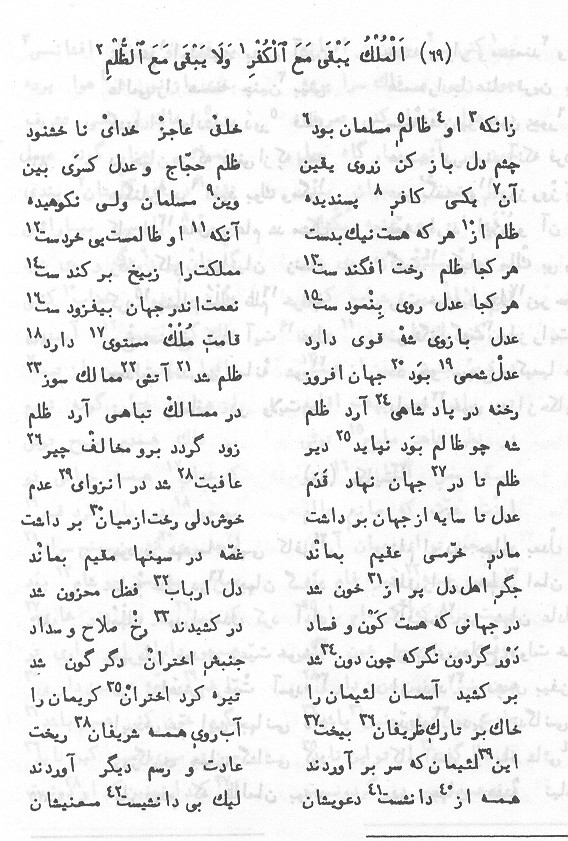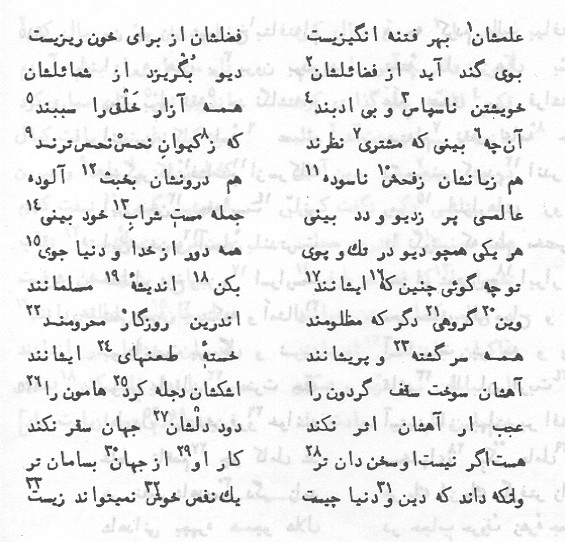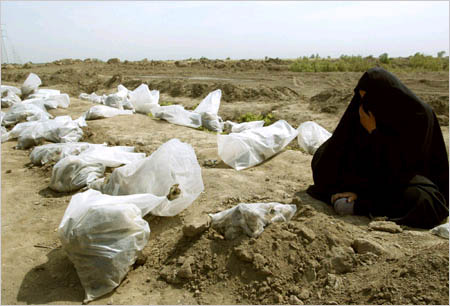
Tariq
ut-Tahqiq (The Path of
Realization)
A True Tale (68)
Discussion
Join
In our times there was an
infidel king, his justice renown to
the entire world. Underneath the shade of his Justice people safely
aligned.
Nurtured his kingdom with justice, Bravo! For such just kings and
rulers.
Compassionate with his subjects, indeed (justice) serving the best
purpose for
his governance. Subjects at peace within his sanctuary gave them much
and
received benevolence evermore in return.
His Lord bestowed upon him
dignity and greatness with
prolonged life. Expanded his dominion and ruled with bliss. And I saw
the
villains not resting even for one week.
The Kingdom can last even if
there is disbelief, but shall
not last with tyranny (69)
Like unto him there was a
Muslim tyrant
His people enslaved and the
Lord discontent
Open the eyes of the heart
with certainty
Behold the tyranny of Hajjaj
and Kasra’s justice [1]
One is a disbelieving infidel
And the other an evil Muslim
Tyranny is hideous by anyone [2]
The tyrant void of all wisdom
Wherever the tyranny spreads
the cloak
Uproots the civilization and
the folk
Whichever place is faced by
justice
Benevolence in the world
increased
Justice strengthens the king’s
arm
Making the kingdom stand
upright
Justice a candle enlightening
the world
Tyranny a fire smoldering the
world
The kingdom withers away with
blight of tyranny
Yet begets destruction and
annihilation from tyranny
A tyrant shall not have a long
life
Soon the opponents shall
overcome
Once the tyranny places its
feet
Well-being in solitude of
nonbeing
Once justice removes its shade
from the world
Disrobes goodhearted-ness from
the folk
The verdant mother of vernal
left barren
Sorrow within the bosoms lain
forever
The heart of the artists
bleeding
The bosom of the wise
melancholy
In this cosmos made up of
“Being and Deterioration” [3]
They veiled the face of
good-will and moral excellence
The wheel of cosmos turned low
Movements of stars disturbed
so
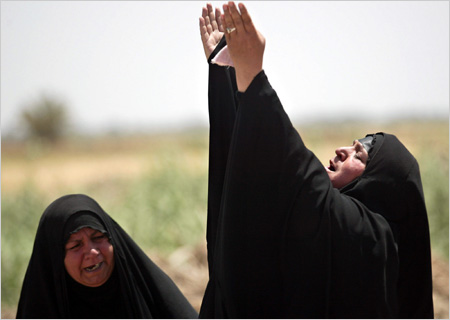
They expanded the sky of the
lowbred
Darkened the stars of the
benevolent
These lowbred once raised
their heads
Alien habits and customs they
spread
They stake a high claim to
knowledge
Indeed their reason devoid of
any knowledge
Their knowledge the instrument
for every trouble
Their merit solely to spill
more blood violent
Acrid stench rises from their
virtues and merits
Away from their faces even the
demons flee
Indeed epitome of ingrate and
crass they are
Indeed the cause of people’s
sufferance they are
Unrest upon their profane
tongues
Polluted with evil their foul
hearts
With devils and demons their
world filled
All drunken with the wine of
self-worship
Each likened to a demon hard
at work
Seeking this world afar from
the Lord
How could you ever stake a
claim?
That they are thought of as
Muslims!
While others indeed tyrannized
In this life deprived and
agonized
All perplexed and in duress
Scolded underneath their
stress
Their moans burnt the ceiling
of cosmos
Their tears made a Tigris out
of Hamoon [4]
Wow! Their sighs exhaled as if
with no effect
Their flaring hearts burnt not
this world into hell
Those lower than the poets [5]
Their lives in better order
The one who knows the world
and the Din [6]
Can never live a single moment
at peace
End.
[1] Kasra
was a legendary Persian king and Hajjaj
was a
legendary brutal Muslim general for more info click here.
[2] Nothing
in Islam
justifies tyranny by will or by accident. Those who justify the
murderous-means
by the end pseudo-religious results are away from Islam.
[3] Original
Arabic phrase is, “Kawn wa Fasad” which means
Existence/Being and Deterioration/withering. This phrase is the name of
an
ancient science, which dealt with cosmology and physical/chemistry, and
transformation of the primal matter to all forms of substances. It also
means
the cosmos or the universe. The poet says these tyrants even changed
the physical
laws in order to destroy good-will.
[4] The
river
Hirmand which flows into the lake Hamoon in Sistan, Rood-e-Koor which
pours
into the lake Bakhtegan in Fars province, and Tajan and
Kashafrood in
northeastern Iran. I assume this is a small body of water, which tears
of
tyrannized people would turn into a Tigris.
[5] Poet
in Sufism is a high ranking spiritual title of a
wise grand leader not just some lyrical person of no worth.
[6] Din
means religion in particular Islam.
©
2005-2002, Dara O. Shayda
